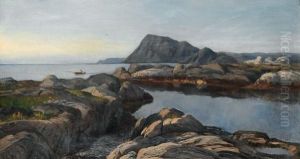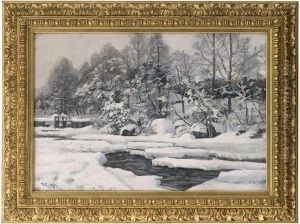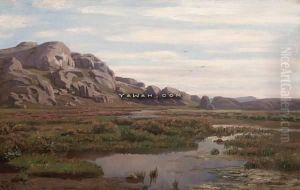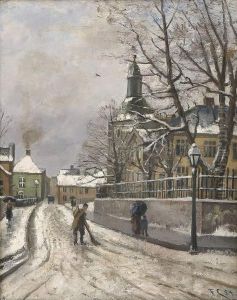Fredrik Collett Paintings
Fredrik Collett was a Norwegian painter, born on December 4, 1839, in Christiania (now Oslo), Norway. He was part of the Norwegian art scene in the late 19th century and is best known for his landscapes that capture the serene beauty of the Norwegian countryside. Collett was among the artists who were influenced by the Düsseldorf school of painting, which was characterized by detailed and polished landscapes.
Collett's artistic journey began at the Military Academy, but his passion for art led him to pursue a career in painting rather than the military. In 1860, he traveled to Düsseldorf, Germany, to study art—a common destination for Scandinavian artists at the time. There, he was influenced by the teachings of Hans Fredrik Gude, a prominent landscape artist and professor who was known for his dramatic and romantic depictions of the Norwegian landscape.
Collett's work is often characterized by a harmonious and peaceful atmosphere, with a delicate rendering of light and color. His paintings frequently featured the Norwegian countryside, including scenes of rural life, the changing seasons, and the unique Nordic light. His approach to landscape painting was somewhat conservative, focusing on the accurate and naturalistic representation of his subjects. He was particularly skilled in capturing the subtle nuances of light, which he used to create a sense of depth and atmosphere in his work.
Throughout his career, Collett exhibited his work in various art exhibitions in Norway and abroad. His paintings were well-received, and he gradually built a reputation as a skilled landscape artist. However, he did not seek much public attention and lived a relatively quiet life devoted to his art.
Fredrik Collett passed away on January 27, 1914. His legacy lives on through his contributions to Norwegian landscape painting, and his works are held in collections across Norway, including the National Gallery in Oslo. Collett's paintings remain a testament to the natural beauty of Norway and an important part of the country's artistic heritage.



